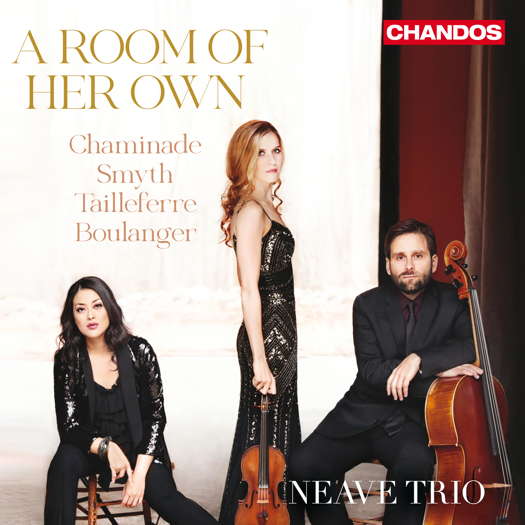 DISCUSSION: John Dante Prevedini leads a discussion about Music and the Visual World, including contributions from Celia Craig, Halida Dinova and Yekaterina Lebedeva.
DISCUSSION: John Dante Prevedini leads a discussion about Music and the Visual World, including contributions from Celia Craig, Halida Dinova and Yekaterina Lebedeva.

Highly Individual
GEOFF PEARCE listens to chamber music by two generations of female composers
'... marvellous unfamiliar music ...'
This great disc features music by two generations of women composers. Interestingly, three of them are French, and the remaining one, Dame Ethel Smyth, whilst being English, was schooled in the German Romantic tradition. All these composers are highly individual, and have a growing appreciation by the music-going public.
The first works on this recording are by Lili Boulanger (1893-1918). This immensely talented but short lived composer has attracted great interest over the years, and the two works presented here were amongst her last compositions.
The first track, D'un matin de printemps, is one of her best known compostions. This and the second track are a pair, and there is similar melodic material linking both. I have heard an orchestral version of this first track. This first movement has a couple of changes in character, the first quite dramatic and restless and the second softer and more lyrical. It is an arresting movement that captures the listener's attention immediately. This performance is colourful and quite defiant, which reflects the piece.
Listen — Lili Boulanger: D'un matin de printemps
(CHAN 20238 track 1, 3:44-4:42) ℗ 2024 Chandos Records Ltd :
The second track, D'un soir triste, is about twice as long as the first and has changes of mood over the course of its ten minutes. The overall feeling, though, is one of sadness and weariness. The harmonic writing is often quite complex and daring for the time, especially in the dramatic passages. I have not heard the orchestral version of this piece, but it is one of the saddest works I have ever heard and highly original.
Listen — Lili Boulanger: D'un soir triste
(CHAN 20238 track 2, 5:06-5:55) ℗ 2024 Chandos Records Ltd :
The next work is by Cécile Chaminade (1857-1944) - a close contemporary of Ethel Smyth - and her music is more romantic in nature than that of the younger Boulanger or Tailleferre. The Piano Trio No 1, Op 11, published in 1881, is in four movements. It has much contrast, and at times reminds me of the music of Dvořák, especially in passages that are lilting in character. There are also passages of great strength. (Many of the critics of the day thought her music was too masculine - maybe one of the reasons she decided to concentrate on miniatures and lighter piano pieces after 1890.) I enjoyed this work for its contrasts, clarity of writing and a fine melodic sense. It has an entrancing spontaneity.
Listen — Cécile Chaminade: Presto leggiero (Piano Trio No 1, Op 11)
(CHAN 20238 track 5, 0:00-0:55) ℗ 2024 Chandos Records Ltd :
Germaine Tailleferre (1892-1983) wrote her Trio at about the same time as Lili Boulanger, but she revised it as late as 1978. Best known as a member of Les Six, her music is only just starting to gain interest again after a long time of relative obscurity. This is another highly original work, and was originally conceived as a three movement piece, but when the composer revised it all those years later, she rewrote a second movement and added an additional one. I had not heard this piece before and it is probably my favourite work on the disc. I do sense the influence of both Debussy and Ravel here. This a work that is certainly performed much more often.
Listen — Germaine Tailleferre: Allegro animato (Trio)
(CHAN 20238 track 7, 3:14-3:59) ℗ 2024 Chandos Records Ltd :
The second movement, which was not the original, is quite stylistically different from the first and third movements, and I could also say the same for the added fourth movement.
Listen — Germaine Tailleferre: Allegro vivace (Trio)
(CHAN 20238 track 8, 0:00-0:44) ℗ 2024 Chandos Records Ltd :
The last work here is the Trio of 1880 by Dame Ethel Smyth (1858-1944). It is obviously influenced by the German tradition, and in particular by Brahms, with whom she was acquainted. At over thirty minutes in length, it is the longest work on this generous album and is very skilfully written. This is the piece that I am happiest about regarding the recording levels and balance. I have heard this work before a couple of times - once a live performance and the other a recording - and it is a piece that I am always happy to hear.
Listen — Ethel Smyth: Presto con brio (Trio)
(CHAN 20238 track 13, 0:00-0:47) ℗ 2024 Chandos Records Ltd :
This is an enjoyable disc of music which is largely seldom performed, and the performances are strong and committed and certainly well up to the considerable technical demands that these works place upon the performers. I feel though that there are times when the recorded levels and placings are not as kind as they could be. I wonder if the microphones were maybe too close, or perhaps it is my playback equipment. Nevertheless, this is a disc of marvellous unfamiliar music to enjoy.
Copyright © 17 January 2024
Geoff Pearce,
Sydney, Australia




